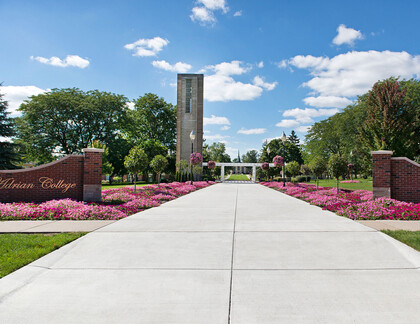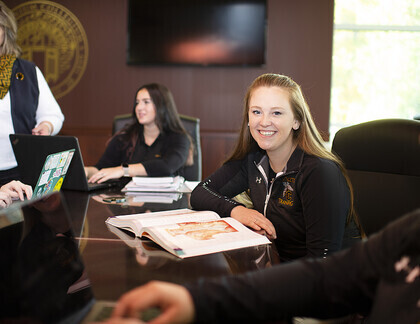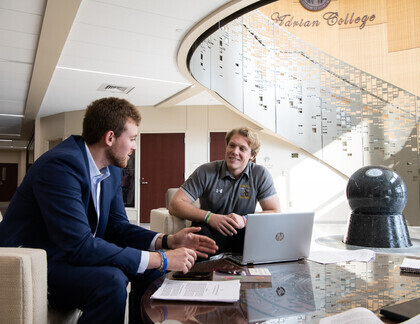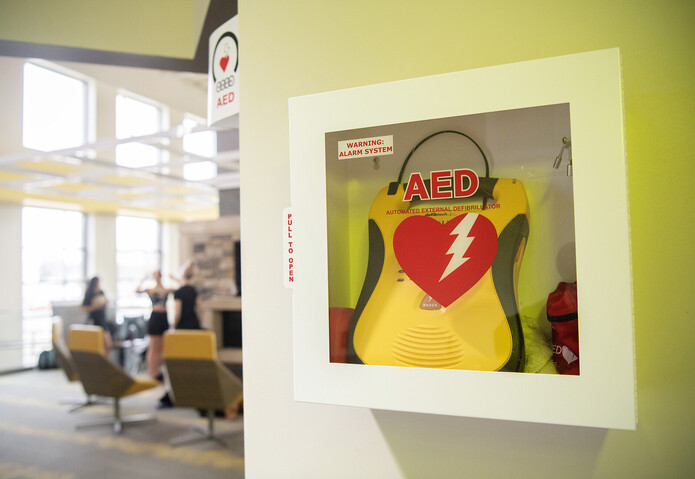Why Adrian?
Whatever your background, Adrian College can provide you with the skills and experience you need to realize your dreams.

Why Adrian?
Whatever your background, Adrian College can provide you with the skills and experience you need to realize your dreams.

Undergraduate Studies
We offer an undergraduate program of study that’s small enough to be personal

Graduate Studies
Pursuing your dream career starts with the next phase of your education. When you enroll in graduate school at Adrian College, you’re beginning more than advanced training in your field; you’re accelerating your professional journey.
Posted Friday, March 10, 2023
Author: Mickey Alvarado

An Adrian College Master’s thesis that became a published paper five years ago was recently cited in an article written by Dr. Sanjay Gupta, CNN’s Chief Medical Correspondent, titled, “Is your school equipped to save a life? Here’s how you’ll know.”
The Adrian College produced research paper, “Radius of Care in Secondary Schools in the Midwest: Are Automated External Defibrillators [AEDs] Sufficiently Accessible to Enable Optimal Patient Care?” was published in the Journal of Athletic Training in 2018. It was authored by Adrian College alum Mike Osterman, PA-C, MPA, MS, ATC (2015), Director of Graduate Athletic Training and Professor Tina Claiborne, Ph.D., ATC, CSCS and Professor Victor Liberi, MS, ATC, CSCS.
Liberi said Osterman was excited to hear about the CNN article using the Adrian College study he carried out and published.
“We’ve always had the mentality that our faculty role is to support students as the primary author, because their original research was the catalyst for the publication,” Liberi said.
Gupta didn’t mention Adrian College’s connection to the research used in the CNN story, but the authors were thrilled some of their hard work was still being used after it was created years ago.
“It is still the only study of its kind,” Claiborne said. “While we didn’t get a ton of direct press, it was still fun for our study to be recognized on the national stage!”
“There is not much out there that has looked at the availability of AEDs,” Liberi said. “It’s easy to count the number of AEDs, but it’s not easy to determine how accessible they are.”
The context to the Adrian College paper is, “Sudden cardiac arrest is the leading cause of death among young athletes. According to the American Heart Association, an automated external defibrillator (AED) should be available within a 1- to 1.5-minute brisk walk from the patient for the highest chance of survival. Secondary school personnel have reported a lack of understanding about the proper number and placement of AEDs for optimal patient care.”
“It was an idea I came up with purely to determine AED accessibility in secondary schools,” Liberi said. “Despite the fact that schools may actually have AEDs, they are often not attainable because they’re too far away, packed away in a closet, or locked up inside a building when they are needed outside.”
The paper concluded, “Schools should strategically place AEDs to decrease the percentage of property area outside the radius of care. In some cases, placement in a centralized location that is publicly accessible may be more important than the overall number of AEDs on site.”
Gupta’s article explored other questions concerning the life-saving devices, such as, are enough people trained to use them?
“I think the basic idea is, the more people trained the better, period,” Liberi said. “It’s that simple. We’ve had alumni who have been in life-saving situations in the athletic realm. Probably a half dozen of them in my short 15 years here at Adrian College. So, this research and what we’re doing in the athletic training program has had an impact.”
Adrian College has nine AEDs in athletic department facilities including: the Athletic Training Room, Arrington Ice Arena, the Merillatt Sports and Fitness Center blue gym and weight room, Nicolay [baseball] Field, the softball facility, the wrestling facility, Docking Stadium and the boathouse. There is also an AED located in the Caine Student Center in Campus Safety.
The AEDs have already helped save a life. Adrian College Athletic Trainer Jamie Fetter said he successfully used one on a coach in 2010.